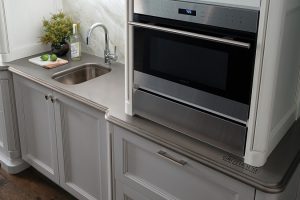Use Your Microwave to Disinfect Kitchen Sponges
Kitchen sponges are notorious for harboring bacteria, but they are also the best thing to get oily and messy residues from your plastics and cutlery. Fortunately, there is no need to throw your sponge in the garbage after a few uses as you can freshen it up in your microwave. Simply put your damp sponge in the microwave on a 30 second program. This will sanitize the sponge and banish any nasty smells.
Steam Clean Your Microwave
As we’re on the topic of microwaves, there is no need to try to scrub or scour those splatters and food remnants, as you can steam clean your microwave. Squeeze two lemon halves into a bowl of water or use a one part white vinegar, three parts water solution. Microwave on medium power for four or five minutes. When the cycle is finished, wipe down the interior with a sponge or paper towels. If there are any stubborn marks remaining, repeat the process.
Use a Dishwasher Magnet
In a busy family home, the dishwasher is likely to be frequently used, but how many times have your kids failed to empty it? Often the excuse is that they didn’t know the load was clean, but this can be prevented with a dishwasher magnet. There are magnets available, or you can make one yourself that shows clean or dirty by rotating it accordingly. All you need to do is adjust the magnet with every load, so there are no excuses to deal with this particular chore.
Mark Your Appliance Start Buttons
Use a round sticker or small piece of tape to mark the start button on your appliances. This can encourage children to help with chores and may make it easier if you have older relatives staying who may struggle to read the small writing and find the right button. You can also mark the most frequently used programs on your washing machine and dishwasher, so you don’t need to be asked every time a load is cleaned.
Collect All Your Appliance Manuals Together
Most of us are guilty of having a junk drawer in our kitchens. It’s often packed with receipts, spare light bulbs and all sort of other kitchen detritus. Unfortunately, this is usually where appliance manuals end up. So, if there is a problem with one of your appliances and you need to decipher an error code, you could spend an hour digging through your junk drawer. A better idea is to collect all your appliance manuals together. Consider putting them in a folder and keeping it with your recipe books, so you’ll always have them on hand if you need them.
If you’re having issues with your kitchen appliances, you can rely on a home appliance repair expert. A professional technician can provide a long term solution to your appliance problems or provide you with expert guidance.
